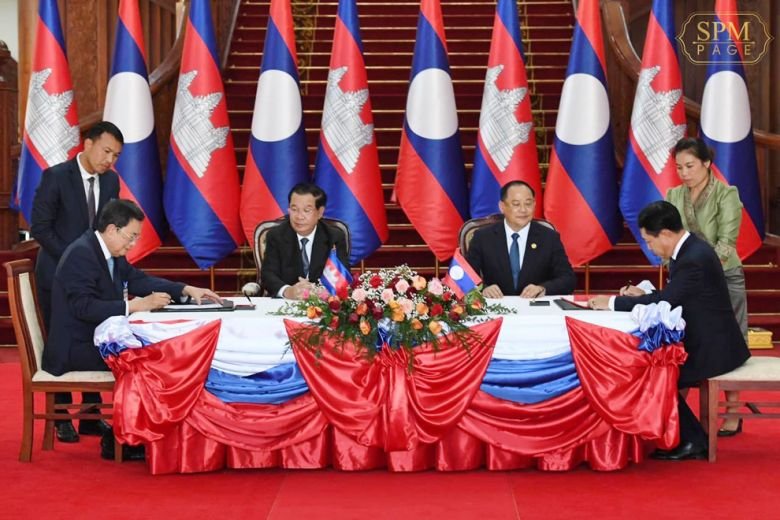February 16, 2023
PHNOM PENH – An agreement regarding cooperation against transnational crime was reached at a February 13 meeting between Prime Minister Hun Sen and his Lao counterpart Sonexay Siphandone during the former’s two-day state visit on February 13-14.
According to the Ministry of Foreign Affairs and International Cooperation, both sides had an in-depth discussion on the state of bilateral relations and the way forward to further strengthen the bonds of traditional friendship and close ties as well as increased cooperation in many areas, ranging from national security, border affairs, trade and investment, air connectivity, tourism, energy and education.
“On security and defence, both sides agreed to strengthen cooperation in fighting against transnational crimes through sharing of information in a timely manner between the authorities at the border areas. [Hun Sen] stressed the importance of the ‘Joint Exercise on Search and Rescue’ along the borders of the two countries,” it said.
On border affairs, both sides welcomed the progress made by the “Joint Boundary Commission” of Cambodia and Laos which has achieved demarcation of approximately 86 per cent of the common land boundary with a total of 121 border posts.
The two leaders encouraged both sides to continue people-to-people exchanges of intellectuals and researchers and to co-publish research and share knowledge between the Royal Academy of Cambodia and the Lao Academy of Social Sciences.
They urged the two academies to expedite the completion of the joint research on “Cambodia-Laos relations: Historical, cultural and people-to-people ties along the borders of the two countries,” and the preparation of a Lao-Khmer/Khmer-Lao dictionary.
Both sides encouraged relevant ministries and institutions to continue to effectively implement the existing memoranda of understanding and agreements on energy cooperation between the two countries to ensure energy stability and security for their national development.
The ministry said the two prime ministers signed two “historically significant” documents, namely the “Treaty on the Demarcation of the State Border between the Kingdom of Cambodia and the Lao People’s Democratic Republic” and the “Action Plan for the Comprehensive and Long-Term Strategic Partnership between the Kingdom of Cambodia and the Lao People’s Democratic Republic (2023-2027)”.
The leaders also witnessed the signing of the “Agreed Minutes of the Meeting of the Cambodia-Laos, Laos-Cambodia Joint Boundary Commission” by Kim Hong – senior minister in charge of border affairs and chairman of the Cambodia-Laos Joint Boundary Commission – and Saleumxay Kommasith, Deputy Prime Minister and Minister of Foreign Affairs and chairman of the Laos-Cambodia Joint Boundary Commission.

The ministry continued that in recognition of the merits and significant contributions of Hun Sen in enhancing friendly relations and close cooperation between Cambodia and Laos, especially the elevation of the relationship to the “Comprehensive and Long-term Strategic Partnership”, Lao President Thongloun Sisoulith conferred the “Medal for Phoxay Lane Xang” (Lane Xang Blessing Medal) on him.
Yang Peou, secretary-general of the Royal Academy of Cambodia, said the agreement to strengthen cooperation in fighting against transnational crimes between the two countries was a good development if they implemented it effectively. He said that lately, there have been media reports about the inflow of drugs and raw materials for production of the contraband via Laos to the Kingdom.
“So, if there is good cooperation to share timely information, we will be able to combat drug trafficking and other transnational crimes because these cross-border crimes will greatly destroy our social economy,” he said.


